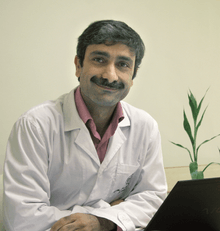Hossein Baharvand
Hossein Baharvand is an Iranian stem cell and developmental biologist, a distinguished professor, the founder and director of Royan Institute[2] for Stem Cell Biology and Technology.[3]
Hossein Baharvand | |
|---|---|
 Hossein Baharvand | |
| Born | February 25, 1972 Isfahan, Iran |
| Nationality | Iranian |
| Alma mater | Shiraz University Shahid Beheshti University Kharazmi University |
| Awards | Razi medical sciences research festival 2012 [1] |
| Scientific career | |
| Fields | Stem cells and Developmental Biology |
| Institutions | Royan Institute University of Science and Culture |
He firstly joined Royan Institute in 1995. He received his B.Sc. in Biology from Shiraz University in 1994, and M.Sc. in Developmental Biology from Shahid Beheshti University, Tehran in 1996. He then obtained his Ph.D. in Cell and Developmental Biology from Khwarizmi University (former Tarbiat Moallem University) in 2004.
For the first time, he generated the mouse and human embryonic stem cells (2003) and induced pluripotent stem cells (2008) in Iran.[4] This has enabled his team to pursue many avenues of research into translational research and regenerative medicine. He has focused his research interests on improving the translational research and regenerative medicine mainly through the understanding of Stem Cells and Developmental Biology and Biologically inspired Engineering.[5] He has been working on transdifferentiation and pluripotent stem cell differentiation into cardiomyocytes, neural cells and hepatocytes. He has also been studying the pluripotency mechanism and germ cell biology. He has also been making numerous contributions to clinical trials and tissue-specific stem cell transplantation; as well as developing cell manufacturing.[6]
He has given numerous tutorials and invited talks in many congresses such as ISSCR (2018).[7] He is the editor of four international books which were published by Springer (2010 and 2012) and John Wiley, USA (2015). He has published 354 international [8] and 102 national peer-reviewed papers, as well as seven chapters in international books, seven books in Persian, and eight translated English text books into Persian. Eight figures of his peer-reviewed publications were selected as cover pages of international journals.[9]
As of November 2018, Google Scholar reports over 9000 citations and h-index 47 to his work.[10] He is currently the editorial board member of eight international journals (e.g., Journal of Biological Chemistry[11] and Scientific Reports from Nature Publishing Group[12]). He holds two USA patents on the basis of his research. He has received 30 international and national awards including 10th (2004), 12th (2006), and 17th (2012) annual Razi research award on medical science hosted by Iran Ministry of Health and Medical Education, 26th Khwarizmi International Award (2013), hosted by Iran Ministry of Science, Research and Technology, 27th annual book of the year of the Islamic republic of Iran (2010), Academy of Medical Sciences of Iran (Dr. Hadavi’s Award in 2010, 2014), International Prof. Yalda Award for Excellence in Medical Sciences (2015) and distinguished Iranian scientist in Biotechnology (2015) and Genetics (2016). He is the winner of the Islamic Educational, Scientific, and Cultural Organization (ISESCO) Prize for research in the field of Biology (2010). Moreover, he was introduced as Prominent Professor in 3rd term of Allameh Tabatabaei’s Award hosted by Iran vice Presidency for Science and Technology, Presidency and National Elite Foundation (2014). He is the winner of the United Nations educational, scientific and cultural organization (UNESCO)-Equatorial Guinea International Prize (2014) for Research in the Life Sciences aimed at improving the quality of human life with his stem cell research and its numerous applications in regenerative medicine.[13] He was also selected as one of the 20 stem cell person of the year 2017 award nominees hosted by THE NICHE site.[14] He is also the winner of the World Academy of Sciences (TWAS) prize in Biology (2019) for his fundamental contribution to the understanding of how pluripotency and differentiation establish and maintain in stem cells[15].
Moreover, as of now three companies are spun off from the work he initiated and directed at the Royan Institute for Stem Cell Biology and Technology including Cell Tech Pharmed as a cell factory for cell therapy,[16] Royan Biotech for production of recombinant proteins,[17] and Royan Stem Cell Technology for banking of cord blood stem cells.[18]
Furthermore, he has had several efforts in publicizing the stem cell biology in Iran and in this regard he with his team established a lab entitled "Stem Cells for all" and a "mobile adventure lab" by an equipped bus.[19] The aim of these participatory teaching and learning methods is to motivate and empower learners to acquire the knowledge, skills, attitudes and values necessary to shape a sustainable future for stem cells and their potentials in regenerative medicine. He has also established “annual international summer school” program since 2010. The participants were trained by invited speakers from abroad to increase international and national interactions and training methods in this field.[20]
References
- "Razi award".
- "Hossein Baharvand's webpage at official portal of Royan Ins". Royan Institute. Retrieved April 28, 2014.
- "Royan Institute for Stem Cell Biology and Technology".
- "Royan Institute official web site: institute developments".
- "The Washington Times: Iran at forefront of stem cell research".
- "Hossein Baharvand's web page at Royan Institute for Stem Cell Biology and Technology website".
- "ISSCR Speakers-Topics".
- Bose, K. S.; Sarma, R. H. (1975). "PubMed papers authored by Hossein Baharvand". Biochemical and Biophysical Research Communications. 66 (4): 1173–9. doi:10.1016/0006-291x(75)90482-9. PMID 2.
- "Hossein Baharvand's CV at Royan Institute for Stem Cell Biology and Technology website" (PDF).
- "Hossein Baharvand's Google Scholar".
- "JBC Editorial Board".
- "SREP Editorial Board".
- "UNESCO Prize for Research in Life Sciences".
- "20 Stem Cell Person of The Year 2017 Award Nominees".
- "Winners of 2019 TWAS Prizes".
- "Cell Tech Pharmed company".
- "Royan Biotech company".
- "Royan Stem Cell Technology for banking of cord blood stem cells".
- "Stem Cells for All Lab".
- "Royan International Summer School".